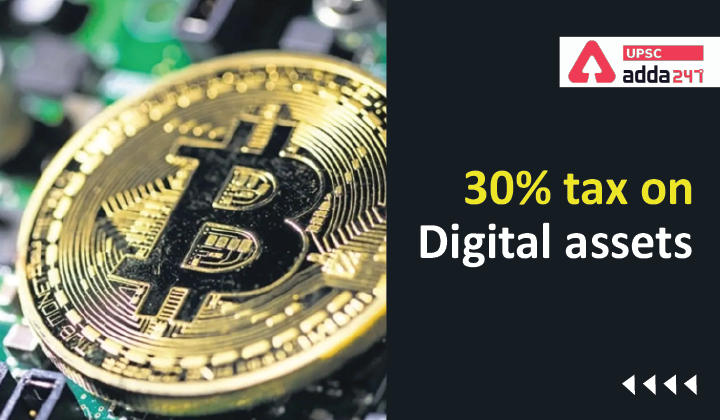Table of Contents
30 percent Tax on Proceeds of Digital Currency: Relevance
- GS 3: Indian Economy and issues relating to planning, mobilization, of resources, growth, development, and employment.
Cryptocurrency: Context
- In the recently published budget 2022, the Finance Minister has proposed to tax any income from the transfer of any virtual digital asset at a rate of 30 percent.
Government imposes 30 percent Tax on Proceeds of Digital Currency: Key points
- The Minister has also imposed a 1 percent tax deduction at source (TDS) of transactions above a monetary threshold.
- Importance: It is the first formal recognition by the Government of increasingly popular financial instruments, such as cryptocurrencies, and applications, such as non-fungible tokens.
- It is also an indication from the Government on implementing its stated plan of recognizing them as assets and not currencies ahead of greater policy clarity that is expected by way of the proposed cryptocurrency Bill.
- Accordingly, a new scheme to provide for the taxation of such virtual digital assets has been proposed in the Bill.
- The Finance Minister also said that the move should not be seen as the Government legalizing or recognizing virtual and cryptocurrencies.
- No deduction in respect of any expenditure or allowance shall be allowed while computing such income except the cost of acquisition.
- Further, loss from the transfer of virtual digital assets cannot be set off against any other income.
Government imposes 30 percent Tax on Proceeds of Digital Currency: Why needed?
- Virtual digital assets have gained tremendous popularity in recent times and the volumes of trading in such digital assets have increased substantially.
- Further, a market is emerging where payment for the transfer of a virtual digital asset can be made through another such asset.
Digital rupee meaning
- The Finance Minister has also proposed that the Reserve Bank of India would issue a digital currency in the upcoming financial year, which would be “riveted in or based on” certain values of gold, money, government assets, or “something similar”.
What is Digital Currency?
- Digital currency, in our case called the ‘digital rupee’, will be issued by the Reserve Bank in digital form and will be fungible with physical currency.
- The exact regulation governing this Central Bank Digital Currency (CBDC) has not been finalized yet.
- CBDC is a digital or virtual currency but it is not comparable to the private virtual currencies or cryptocurrencies that burgeoned over the last decade.
- Private virtual currencies do not represent any person’s debt or liabilities as there is no issuer.
- CBDC is the same as currency issued by a central bank but takes a different form than paper (or polymer).
- It is the sovereign currency in an electronic form and it would appear as a liability (currency in circulation) on a central bank’s balance sheet.
- The underlying technology, form and use of a CBDC can be molded for specific requirements. CBDCs should be exchangeable at par with cash.



 TSPSC Group 1 Question Paper 2024, Downl...
TSPSC Group 1 Question Paper 2024, Downl...
 TSPSC Group 1 Answer key 2024 Out, Downl...
TSPSC Group 1 Answer key 2024 Out, Downl...
 UPSC Prelims 2024 Question Paper, Downlo...
UPSC Prelims 2024 Question Paper, Downlo...
